Timeline
More from year 1969
Spread the love! If you like what you are seeing, share it on social networks and let others know about The Paul McCartney Project.
About
Allen Klein had negotiated a new contract for The Beatles with EMI / Capitol, resulting in an increased royalty rate, which was signed on this day. From beatlesbible.com:
Since May 1969, Klein had been arguing for an improved royalty rate. The Beatles’ financial situation was precarious, he said, and it was in EMI’s interests to provide a better deal for them. The group had almost fulfilled the minimum terms of their existing contract from January 1967, having delivered numerous hit singles, the double Magical Mystery Tour EP, the double album The Beatles (White Album), the Yellow Submarine soundtrack, and the best-selling Sgt Pepper’s Lonely Hearts Club Band.
The November 1968 release of the White Album had pushed EMI’s share of the UK record market up from 28% to around 40%, and had accounted for more than £900,000 in retail sales. Furthermore, The Beatles were shortly to release Abbey Road, which put Klein in a strong bargaining position.
The Beatles’ existing deal with EMI and Capitol gave them 17.5% of the US wholesale price – a considerable amount already. Klein was able to increase to 25%. He was able to argue that, should the label object, The Beatles would cease to record for them.
In return for the higher rate, The Beatles would deliver two new albums each year, whether as a group or individually, until 1976. Under the terms of the deal, new albums would earn 58 cents until 1972, and 72 cents thereafter.
Klein also gained Apple Corps the right to manufacture and sell The Beatles records in the US. EMI would retain the recordings, but Capitol would manufacture the releases on Apple’s behalf. Apple would then profit from the difference between manufacturing and retail costs.
The new terms gave The Beatles the right, for the first time, to determine the ways in which their music was manufactured and sold. By 1971 the group’s entire back catalogue was made available on Apple Records. The Beatles’ personal incomes were greatly improved, and Apple was guaranteed a regular income until at least 1976.
The contract was signed on this day by Paul McCartney (despite his despise of Allen Klein), John Lennon, and Ringo Starr. George Harrison was absent but would sign it some days later.
Even McCartney congratulated me over the new record deal.
Allen Klein – From “The Beatles: Off the Record” by Keith Badman
I did a great deal with EMI and Capitol. They knew they couldn’t stop an artist recording. So, up went the royalty rates. We account for over fifty per cent of Capitol Record’s business. They’re just our distributors. I did Capitol a great favour. I delivered them product. These boys want to work, but you have to motivate them. They won’t work while a record company is screwing them. But, when somebody gets rid of the bullshit, and they’re getting a fair deal, they’ll work.
Allen Klein – From “The Beatles: Off the Record” by Keith Badman
I happened to be in the building and they said, would you take a picture? And I did. It was all very haphazard. I didn’t know what it was for. To be honest, I thought they were signing a napkin or something. But I got the feeling there was a very bad atmosphere in the room. You could tell it wasn’t a happy place to be.
David Nutter, photographer – From “And In The End” by Ken McNab

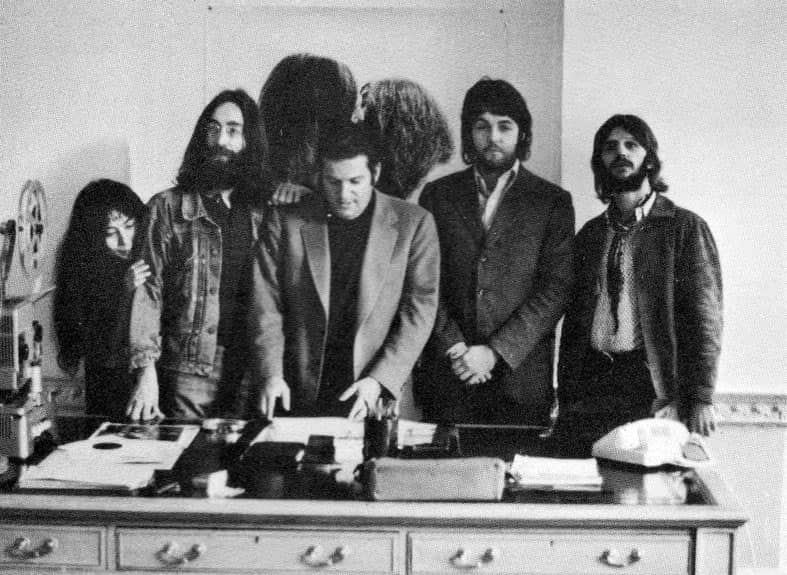

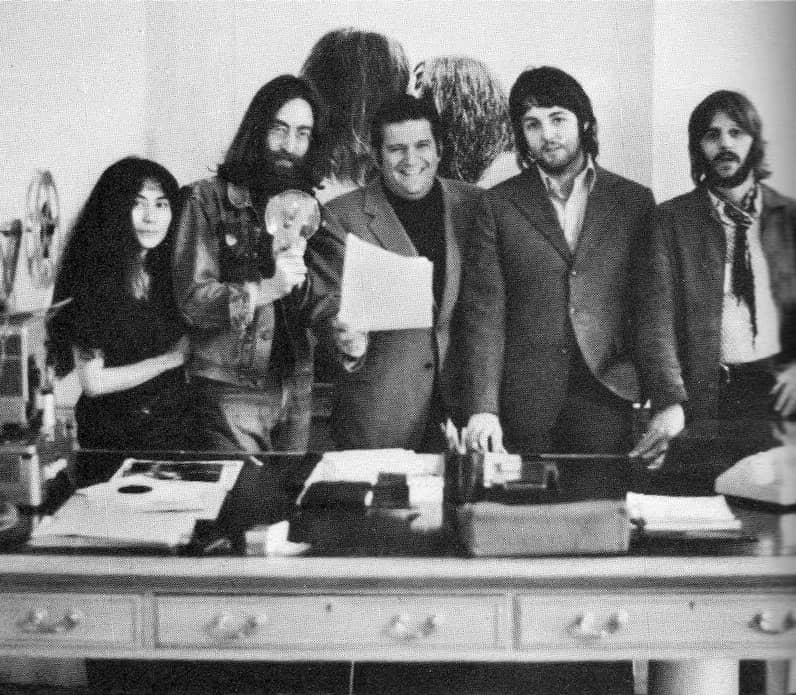
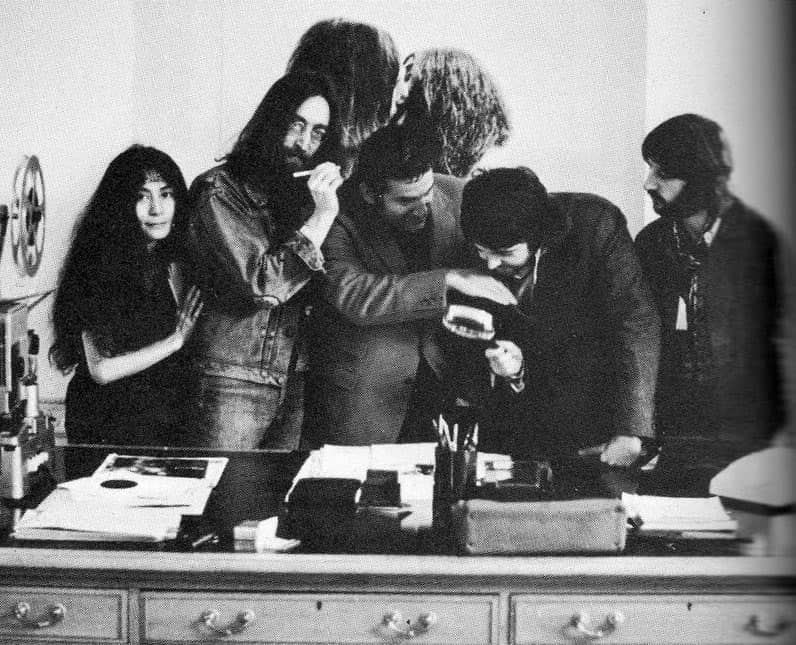
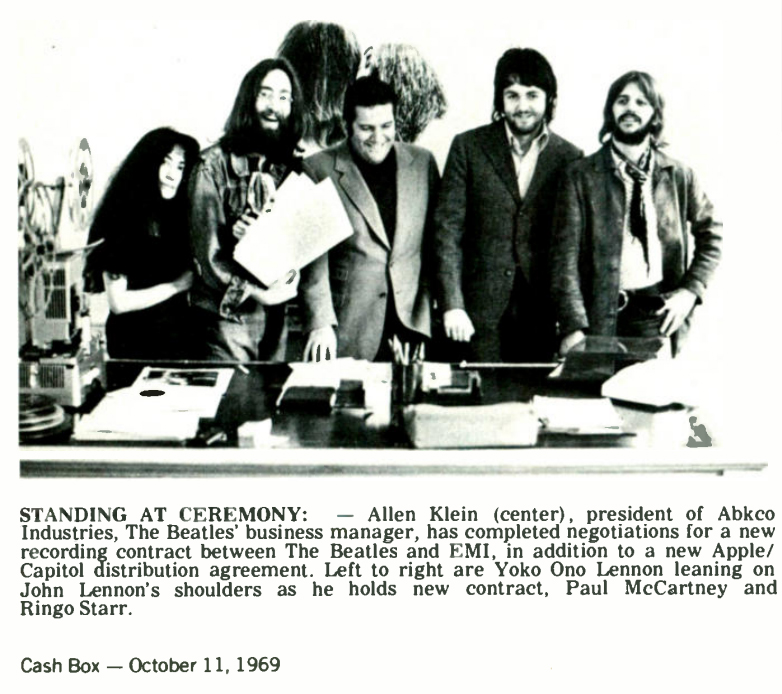
But the highlight of this day was John Lennon announcing his decision to leave The Beatles. From Wikipedia:
On 8 September, while Starr was in hospital, Lennon, McCartney and Harrison met to discuss recording a follow-up to Abbey Road. In the meeting Lennon and Harrison expressed frustration with having to compete with McCartney to get their songs recorded. Lennon proposed a different approach to songwriting by ending the Lennon–McCartney pretence and having four compositions apiece from Lennon, McCartney and Harrison, with two from Starr and a lead single around Christmas. Harrison referred to the possibility of a new Beatles album in an interview he gave in November, and he called this songwriting arrangement “an equal rights thing”. McCartney later dismissed the new division of songwriting, saying it “wasn’t the right balance” and was “too democratic for its own good”. Speaking to Melody Maker in September, Lennon said: “The trouble is we’ve got too much material. Now that George is writing a lot, we could put out a double album every month …” During the 8 September meeting, McCartney expressed that, before Abbey Road, he “thought that George’s songs weren’t that good”, to which Lennon reacted by saying none of the other Beatles liked McCartney’s “Ob-La-Di, Ob-La-Da” and “Maxwell’s Silver Hammer” and that those types of songs should be given to other artists to record.
Soon after the sessions for Abbey Road, Lennon’s heroin use inspired him to record “Cold Turkey” with his and Ono’s conceptual group, the Plastic Ono Band, after the Beatles had rejected the song for release as a single. The formation of the Plastic Ono Band was conceived as an artistic outlet for Lennon and Ono, but the enthusiastic reception afforded their performance at the Toronto Rock and Roll Revival on 13 September 1969 ostensibly crystallised Lennon’s decision to leave the Beatles, which he made on the flight back to London. During a band meeting at Apple on 20 September, he informed McCartney, Starr and Klein of his decision (Harrison was not present at the meeting), telling them he wanted a “divorce”. That same day, the band signed a renegotiated recording contract with Capitol Records, guaranteeing them a higher royalty rate. The sensitivity of the negotiations with Capitol led to Klein and McCartney urging Lennon to keep his announcement private, which Lennon agreed to do.
When I got back [from Toronto] there were a few meetings and Allen said, ‘Cool it,’ ’cause there was a lot to do [with The Beatles] business-wise, and it wouldn’t have been suitable at the time. Then we were discussing something in the office with Paul and Paul was saying to do something, and I kept saying, ‘No, no, no’ to everything he said. So it came to a point that I had to say something. So I said, ‘The group’s over, I’m leaving.’ Allen was there, and he was saying, ‘Don’t tell.’ He didn’t want me to tell Paul even. But I couldn’t help it, I couldn’t stop it, it came out. And Paul and Allen said they were glad that I wasn’t going to announce it, like I was going to make an event out of it. I don’t know whether Paul said, ‘Don’t tell anybody,’ but he was damn pleased that I wasn’t. He said, ‘Oh well, that means nothing really happened if you’re not going to say anything.’
So that’s what happened. So, like anybody when you say divorce, their face goes all sorts of colours. It’s like he knew really that this was the final thing; and six months later he comes out with whatever. I was a fool not to do it, not to do what Paul did, which was use it to sell a record.”
John Lennon – From Lennon Remembers, Jann S Wenner, 1970
After the Plastic Ono Band’s debut in Toronto, we had a meeting in Savile Row where John finally brought it to its head. He said: ‘Well, that’s it, lads. Let’s end it.’ And we all said ‘yes’. And though I said ‘yes’ because it was ending (and you can’t keep it together anyway, if this is what the attitude is) I don’t know if I would have said, ‘End it.’ I probably would have lingered another couple of years.
But when we all met in the office, we knew it was good. It wasn’t sulky and we weren’t really fighting. It was like a thought came into the room, and everyone said what they said. John didn’t think we should leave, just that we should break it up. It was not: ‘I’m leaving, you’re leaving.’ It was: ‘Well, that’s it! I’ve had enough. I want to do this…’
If that had happened in 1965, or 1967 even, it would have been a mighty shock. Now it was just ‘let’s get the divorce over with’, really. And John was always the most forward when it came to nailing anything.
Ringo Starr – From The Beatles Anthology, 2000
At that point, John looked at me and his actual words were, ‘Well, I think you’re daft,’ which was a little bit of a show-stopper. He said, ‘Well, I wasn’t going to tell you till after we’d signed the Capitol contract, but we’re breaking the group up. Klein asked me not to tell you, but seeing as you asked me, I’m leaving the group.’
Paul McCartney – From “The Beatles: Off the Record” by Keith Badman
We were all summoned to sign a new Capitol contract at Apple. We all went round to do it, and it got a little bit “Well, why are we doing this? Are we sure the group is going to continue?”‘ “Oh, sure, it’ll all continue.” “Well, how’s it going to continue? What are we going to do? Massive big shows?”‘ Then I propounded the theory, “I think we should get back to our basics. I think we’ve got out of hand, we’ve overwhelmed ourselves and I think what we need is to re-establish our musical identity and find out who we are again, and so we should go back to little gigs.” At that point, John looked at me and said, “Well, I think yet daft!” Which was a little bit of a show-stopper. He said, “Well, I wasn’t gonna tell you till after we’d signed the Capitol contract. Klein asked me not to tell you. But, seeing as you asked me, I’m leaving the group.” So everyone went, “Gulp!” The weight was dropped, our jaws dropped along with it, everyone blanched except John, who coloured a little and said, “It’s rather exciting. It’s like I remember telling Cynthia I wanted a divorce.” And I think from what he was saying there was an adrenalin rush that came with telling. So that was it. We signed the new Capitol deal in a bit of a daze, not quite knowing why we’d done it. That’s my recollection.
Paul McCartney – From “Many Years From Now” by Barry Miles, 1997
The group was getting very tense and it looked like it was going to break up. We had a meeting and it was getting very serious. It was all Apple and Allen Klein, and no one was enjoying themselves. We had forgotten the music, it was just business … We were summoned to sign a new Capitol contract at Apple … and it got a little bit, ‘Well, why are we doing this? Are we sure the group is going to continue? What are we going to do? Massive big show?’ Then I propounded the theory, ‘I think we should get back to our basics. I think we’ve got out of hand. We’ve overwhelmed ourselves and I think what we need is to re-establish our musical identity and find out who we are again, and so we should go back to little gigs’ … Small bands, go back and do the clubs, sod it, let’s get back to square one and remember what it was all about, and get back.
Paul McCartney – From “The Beatles: Off the Record” by Keith Badman
I’d said: ‘I think we should go back to little gigs – I really think we’re a great little band. We should find our basic roots, and then who knows what will happen? We may want to fold after that, or we may really think we’ve still got it.’ John looked at me in the eye and said: ‘Well, I think you’re daft. I wasn’t going to tell you till we signed the Capitol deal’ – Klein was trying to get us to sign a new deal with the record company – ‘but I’m leaving the group!’ We paled visibly and our jaws slackened a bit.
I must admit we’d known it was coming at some point because of his intense involvement with Yoko. John needed to give space to his and Yoko’s thing. Someone like John would want to end The Beatles period and start the Yoko period; and he wouldn’t like either to interfere with the other. But what wasn’t too clever was this idea of: ‘I wasn’t going to tell you till after we signed the new contract.’ Good old John – he had to blurt it out. And that was it. There’s not a lot you can say to, ‘I’m leaving the group,’ from a key member.
I didn’t really know what to say. We had to react to him doing it; he had control of the situation. I remember him saying, ‘It’s weird this, telling you I’m leaving the group, but in a way it’s very exciting.’ It was like when he told Cynthia he was getting a divorce. He was quite buoyed up by it, so we couldn’t really do anything: ‘You mean leaving’? So that’s the group, then…’ It was later, as the fact set in, that it got really upsetting.
Paul McCartney – From The Beatles Anthology, 2000
Towards the end of 1969, John had quite gleefully told us it was over. There were a few of us in the Apple boardroom at the time. I think George was away visiting family, but Ringo and I were at the meeting, and John was saying no to every suggestion. I thought we should go back to playing smaller gigs again, but the answer came back: “No”. Eventually John said, “Oh, I’ve been wanting to tell you this, but I’m leaving the Beatles.’” We were all shocked. Relations had been strained, but we sat there saying, “What? Why? Why? Why?” It was like a divorce, and he had just had a divorce from Cynthia the year before. I can remember him saying, “Oh, this is quite exciting.” That was very John, and I had admired this kind of contrarian behaviour about him since we were kids, when I first met him. He really was a bit loony, in the nicest possible way. But while all of us could see what he meant, it was not quite so exciting for those left on the other side.
Paul McCartney – From Paul McCartney reveals the stories behind his greatest hits | The Sunday Times Magazine, 2021
We weren’t going to say anything about it for months, for business reasons. But the really hurtful thing to me was that John was really not going to tell us. I think he was heavily under the influence of Allen Klein. And Klein, so I heard, had said to John – the first time anyone had said it – “What does Yoko want?” So since Yoko liked Klein because he was for giving Yoko anything she wanted, he was the man for John. That’s my theory on how it happened.
Paul McCartney – From interview with Playboy, 1984
There would be many hints in the coming months suggesting that The Beatles were about to break up, including a non-ambiguous statement by Paul McCartney in the interview he gave to Life Magazine in November 1969:
The Beatle thing is over. It has been exploded, partly by what we have done, and partly by other people. We are individuals, all different. John married Yoko, I married Linda. We didn’t marry the same girl.
Paul McCartney
But what would be considered as an official announcement would come in April 1970 – eight months after – when Paul McCartney would issue the press release for its first solo album, “McCartney“.
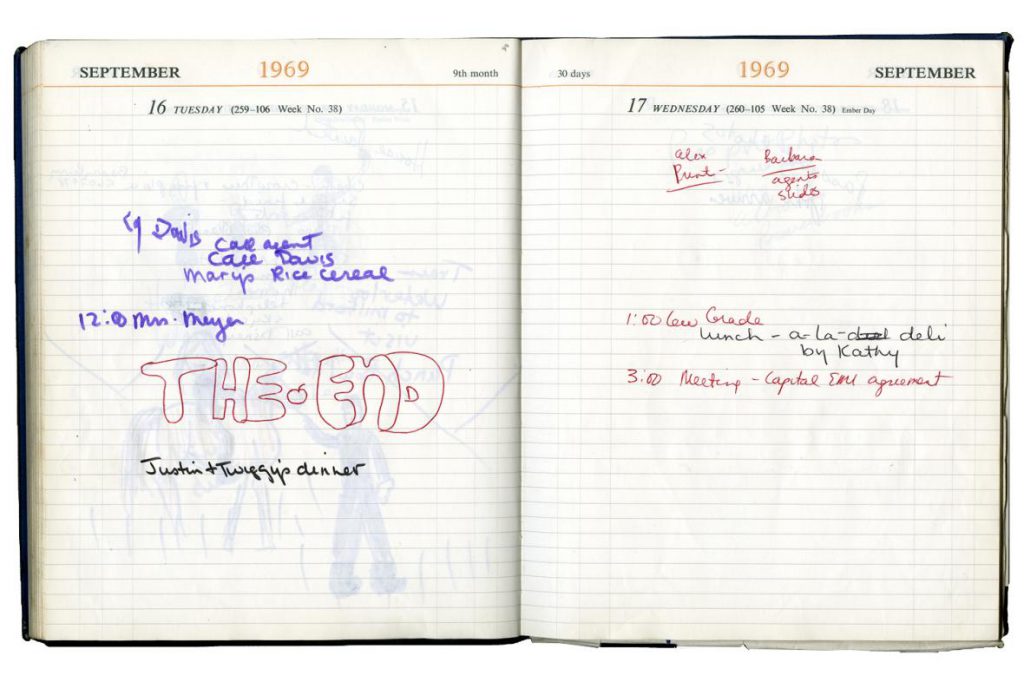
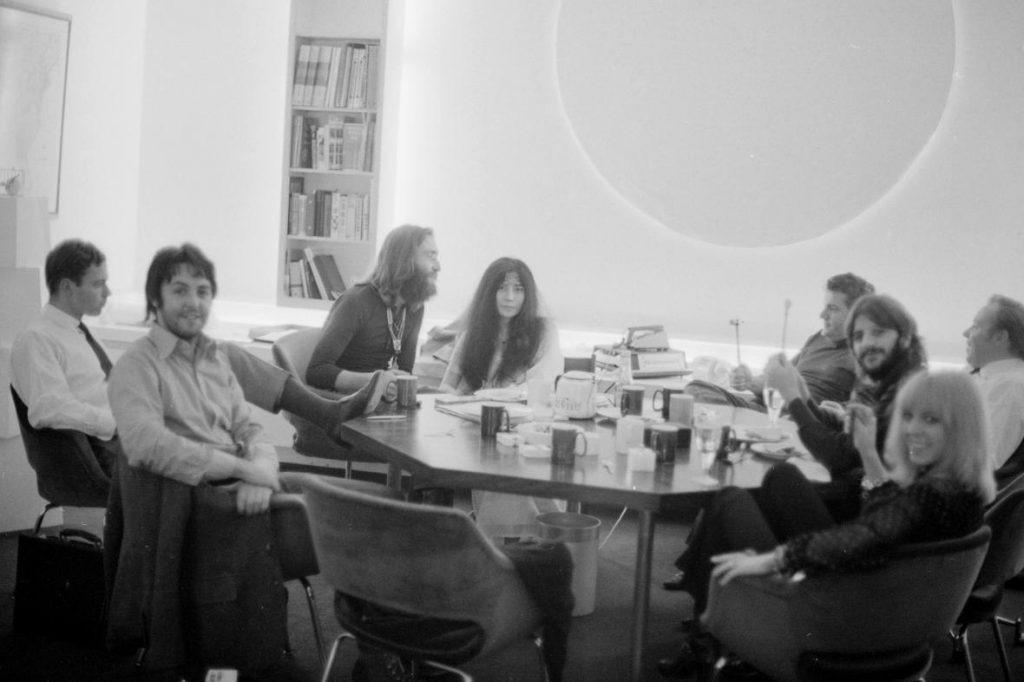
Last updated on March 26, 2022
Going further
The Beatles Diary Volume 1: The Beatles Years
"With greatly expanded text, this is the most revealing and frank personal 30-year chronicle of the group ever written. Insider Barry Miles covers the Beatles story from childhood to the break-up of the group."
We owe a lot to Barry Miles for the creation of those pages, but you really have to buy this book to get all the details - a day to day chronology of what happened to the four Beatles during the Beatles years!
If we like to think, in all modesty, that the Paul McCartney Project is the best online ressource for everything Paul McCartney, The Beatles Bible is for sure the definitive online site focused on the Beatles. There are obviously some overlap in terms of content between the two sites, but also some major differences in terms of approach.

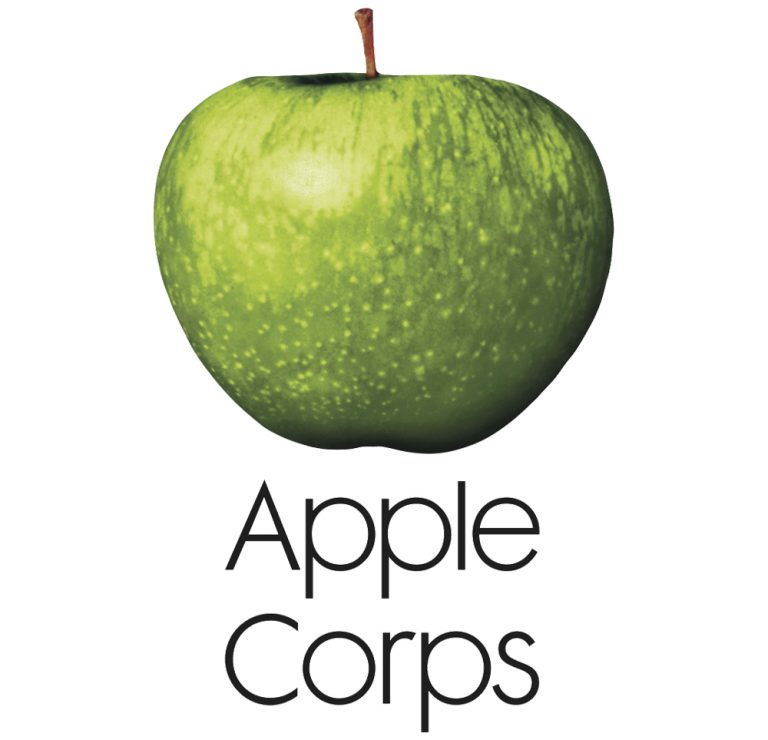


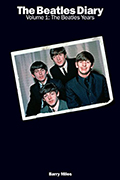
Contribute!
Have you spotted an error on the page? Do you want to suggest new content? Or do you simply want to leave a comment ? Please use the form below!